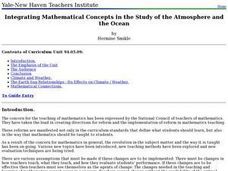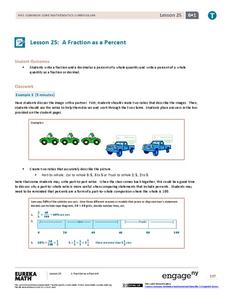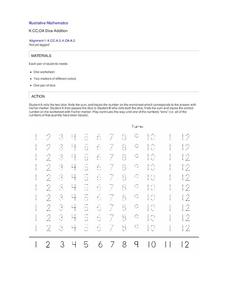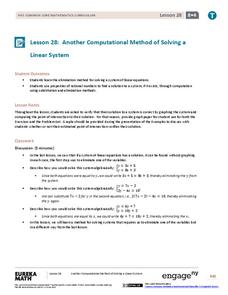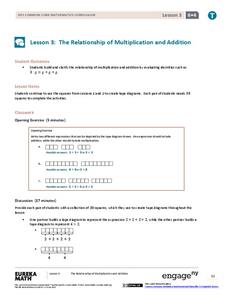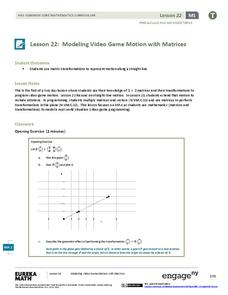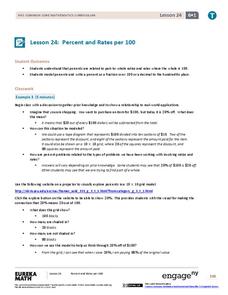Curated OER
Writing Equations from a Table
Students graph and evaluate equations. In this algebra lesson, students are given pairs of coordinates and asked to write an equation representing the values. They are also given values to plug in to their equations and evaluate.
Curated OER
Exploring Geometry in the Real World
Students find real-world examples of a variety of geometric shapes. They conduct research, record observations, and write descriptions. They create a classroom cityscape and highlight the information they gathered. They present an oral...
Curated OER
Mathematical Properties
Seventh graders discuss the associative property of math. They are to find examples of the property and others. They also write in their journals about what they learned.
Curated OER
Integrating Mathematics Into Literature
Students discuss tables, multiples, fractions, ratios, and probability while participating in daily activities in this cross-curricular Math lesson using examples from Literature. State standards in Mathematics are addressed over the...
Curated OER
Integrating Mathematical Concepts in the Study of the Atmosphere and the Ocean
Pupils utilize problem solving strategies that emphasis writing in mathematics, and strategies that have students make decisions and draw conclusions. They connect math to weather and climate topics.
Curated OER
Investigation - Who is Right?
Third graders investigate two mathematic scenarios and determine which is correct. They compare adding columns and places (such as the tens place, hundreds place, and so on) and familiarize themselves with how to add larger numbers.
Curated OER
Missing Number
First graders examine how to use a symbol and shape variable to represent a missing value in a mathematical equation. They listen to the book "Fish Eyes" and "One Less Fish," and observe the teacher write an equation represented for each...
EngageNY
Solving Area Problems Using Scale Drawings
Calculate the areas of scale drawings until a more efficient method emerges. Pupils find the relationship between the scale factor of a scale drawing and the scale of the areas. They determine the scale of the areas is the square of the...
EngageNY
A Fraction as a Percent
It is all about being equivalent. Class members convert between fractions, decimals, and percents. By using visual models, scholars verify their conversions in the 25th portion of a 29-part series.
Curated OER
Math On the Job
Investigate different types of math required for specific jobs. In this math in occupations activity, use the Internet to research what type of math one might need to know in order to be successful in different jobs. Complete a related...
Curated OER
The Battle for Ultimate Power
Middle schoolers gain an understanding of how the powers of 10 and scientific notation can be used to represent the scale of things in the universe. They relate the number of stars in the universe to the number of grains of sand on...
EngageNY
Negative Exponents and the Laws of Exponents
Apply the properties of exponents to expressions with negative exponents. The fifth lesson in the series explains the meaning of negative exponents through an exploration of the properties taught in the previous lessons of the series....
Curated OER
Dice Addition
Using the provided tracing number worksheet, a pair of kindergartners will practice their adding skills. Player A will roll two die, add the sum, and then trace the sum on the worksheet. Player B will take a turn and do the same. The...
EngageNY
Vectors and the Equation of a Line
Represent linear equations in both two and three dimensions using parametric equations. Learners write parametric equations for linear equations in both two and three variables. They graph and convert the parametric equations to...
EngageNY
Another Computational Model of Solving a Linear System
The process of elimination really works! Use elimination when substitution isn't doing the job. The 29th segment in a series of 33 introduces the elimination method to solving linear systems. Pupils work several exercises to grasp the...
EngageNY
Even and Odd Numbers
Even or not, here I come. Groups investigate the parity of products and sums of whole numbers in the 17th lesson in a series of 21. Using dots to represent numbers, they develop a pattern for the products of two even numbers; two odd...
EngageNY
The Relationship of Multiplication and Addition
You know 4 + 4 + 4 = 3(4), but what about x + x + x? Pairs work together to develop equivalent expressions relating multiplication and addition in the third lesson plan of a 36-part series. They extend their knowledge of multiplication...
Curated OER
Fishing Adventures 3
Your young boaters will enjoy writing and solving inequalities, and representing the solution graphically in this task set in the context of renting a boat.
EngageNY
Modeling Video Game Motion with Matrices 1
Video game characters move straight with matrices. The first day of a two-day lesson introduces the class to linear transformations that produce straight line motion. The 23rd part in a 32-part series has pupils determine the...
EngageNY
Designing Your Own Game
Your classes become video game designers for a day! They utilize their matrices, vectors, and transformation skills to create and design their own game images. The complex task requires learners to apply multiple concepts to create their...
EngageNY
Interpreting Quadratic Functions from Graphs and Tables
Seeing functions in nature is a beautiful part of mathematics by analyzing the motion of a dolphin over time. Then take a look at the value of a stock and maximize the profit of a new toy. Explore the application of quadratics by...
EngageNY
Comparing Integers and Other Rational Numbers
The ninth installment of a 21-part module has pupils compare integers and rational numbers in decimal and fraction form. They match stories to number lines and compare values in the stories.
EngageNY
The Long Division Algorithm
Two methods are always better than one! The eighth installment in this series asks pupils to convert decimals to fractions using two approaches. Individuals first use the more traditional approach of long division and then use reverse...
EngageNY
Percent and Rates per 100
What percentage of your class understands percents? Pupils learn the meaning of percents based upon rates per 100 in the 24th lesson in a series of 29. They represent percents as fractions, decimals, ratios, and models. The scholars...






